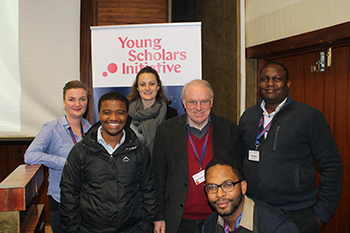Latest News Archive
Please select Category, Year, and then Month to display items
![]()
#UFSupdate (18 March 2020): UFS IMPLEMENTS MEASURES TO MINIMISE RISK OF COVID-19 TO STAFF
STATEMENT BY PROF FRANCIS PETERSEN, RECTOR AND VICE-CHANCELLOR
The executive management of the University of the Free State (UFS) welcomes the announcement of Dr Blade Nzimande, Minister of Higher Education, Science and Technology on 17 March 2020 that all post-school training institutions will have an early recess, starting on 18 March 2020. The Minister’s directive that universities should minimise risk of COVID-19 to all its staff during this time is also welcomed.
The announcement of Dr Nzimande is in line with the university’s decision on 16 March 2020 to suspend the academic programme as from 17 March 2020 and to resume it again on 14 April 2020.
It is important for us all to know that this is not business as usual, and that different thinking is required. Responsible citizenship is one of the crucial elements the world has increasingly been experiencing for the past few weeks. This is why we must act out our responsibility towards one another by focusing on ways in which social distancing can be achieved – especially during this low-risk period that South Africa is still experiencing. This is one of the reasons that informed the university’s decision on 16 March 2020 week to suspend the academic programme and also for students to vacate the residences by 20 March 2020.
The health and well-being of our staff members are equally important. The university’s Employee Task Team that was established on 16 March 2020 analysed options for the continuation of university operations during the recess period. These options were submitted to the executive management, discussed with the Chairperson of the UFS Council and approved on 18 March 2020.
Staff members who have children at school and pre-school may work from home on 19 and 20 March 2020. For the period 23 March 2020 to 13 April 2020, the number of staff members present on all three campuses will be reduced to a minimum and staff members may be allowed to work from home where practically possible.
Arrangements have been made to accommodate those staff members who are performing services which cannot be done from home (such as cleaning, gardening, maintenance, sports, etc) in a flexible and reasonable way. Similar arrangements will be made with office-based support services staff, prioritising institutional needs and based on humane and personal circumstances. Academic staff have been requested to ensure that the online learning materials are finalised and made available for the online learning platform.
The decision for employees to work from home is based on the premise that all employees are deemed to be at work from 23 March 2020 to 13 April 2020. This requires staff members to be available and contactable by line managers at all times during the university’s normal working hours.
I am comfortable that these measures will alleviate the concerns from our staff regarding the spreading of COVID-19 and the risk to themselves without compromising university operations.
Prof F W Petersen
Rector and Vice-Chancellor
University of the Free State
Professor from Cambridge University addresses young scholars
2017-07-18

In the first conference of its kind on the African continent,
the Universityof the Free State’s Bloemfontein Campus
was privileged to host the Young Scholars Initiative conference.
Photo: Siobhan Canavan
“It doesn’t matter where a concept originates from if it works. The problem arises when the concept does not work.”
These were the words of Prof Gareth Austin in his address at the Young Scholars Initiative (YSI). His keynote focused on the “Economic History in Africa’s Decolonisation and Development”.
The African economic history
Prof Austin, a professor in Economic History at the University of Cambridge, discussed how African economic history has always been about development, and also gave a brief periodisation of the economic historiography of Africa.
In his closing remarks he focused more on history and economics. “Economics is a sensible approach to take, where history matters because of the sense of context.”
Reflecting on the African experience
A total of 65 young and senior scholars from five continents attended the conference Decolonising Africa? The Economic History of Development, hosted by the YSI in partnership with the International Studies Group at the UFS.
The conference, held from 8 to 9 June 2017, provided an opportunity to reflect on the African experience from an historical perspective and to assess the current position of the continent in the global economy. It discussed new themes in development, such as the role of women, minorities, and entrepreneurs.
The conference focused on how the business community has operated in an Africa that still faces inequalities and unfair terms of trade and lacks a unified political will.